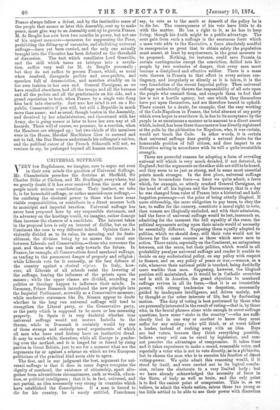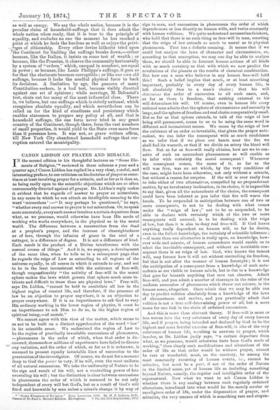UNIVERSAL SUFFRAGE.
VERY few Englishmen, we imagine, care to argue out even in their own minds the question of Universal Suffrage. Mr. Chamberlain preaches the doctrine at Sheffield, Sir Charles Dilke at Chelsea, and Mr. Bradlaugh everywhere, but we greatly doubt if it has ever received from the mass of the people much serious consideration. Their instinct, we take it, is for household suffrage, or rather married-man suffrage,— for confining the electoral power to those who have some visible responsibilities, or contribute in a direct manner both to municipal and imperial taxation. Universal suffrage has never been proposed here by any responsible statesman, and its advocacy on the hustings would, we imagine, rather damage than increase the chances of a candidate. The interest taken in the proposal here is only an interest of dislike, but on the Continent the case is very different indeed. Opinion there is violently divided as to its value, its meaning, and its desir- ableness, the division being by no means the usual one between Liberals and Conservatives,—those who reverence the past, and those who can look only towards the future. In France, for example, all Conservatives dread manhood suffrage, -as tending to the permanent danger of property and religion ; while Liberals vote for it earnestly, as the best defence of the country against a clerical regime. In Italy, how- ever, all Liberals of all schools resist the lowering of the suffrage, fearing the influence of the priests upon the masses ; while the upper classes are divided, according as politics or theology happen to influence their minds. In Germany, Prince Bismarck introduced the new principle into the Imperial Parliament, avowedly as a Conservative measure ; while moderate statesmen like Dr. Simson appear to doubt whether in the long run universal suffrage will tend to strengthen the Liberal party, or the Conservative party, or the party which is supposed to be more or less menacing
property. In Spain it is very doubtful whether true universal suffrage would not restore Isabella to the throne, while in Denmark it certainly would try one of those strange and entirely novel experiments of which all men who have read history have an instinctive dread. It may be worth while, therefore, while all Europe is ponder- ing over the method, and it is longed for or feared by rising parties in Great Britain, just to see for a moment what are the arguments for or against a scheme on which no two European politicians of the practical kind seem able to agree. The first, and in our judgment the best, argument for uni- versal suffrage is that it does in some degree recognise the dignity of manhood, the existence of citizenship, apart alto- gether from adventitious circumstances, such as wealth, educa- tion, or political intelligence ; that it is, in fact, universal, and not partial, an idea necessarily very strong in countries which have established the Conscription. If a man is forced to die for his country, he is surely entitled, Frenchmen say, to vote as to the merit or demerit of the policy he is to die for. The consequences of his vote have little to do with the matter. He has a right to it, as he has to keep living, though his death might be a public advantage. The next gain from such a suffrage is the enormous force which a mass vote adds to the Executive, a force absolutely needful in emergencies so great that to obtain safety the population must assent, at least by acquiescence, in the great measure to
be proposed. Nothing, for instance, could save Prussia. ji certain contingencies except the conviction, drilled into her
people by two centuries of danger, that every man must become a disciplined and effective soldier. There is a mass vote thrown in Prussia to that effect in every serious con- tingency, and irregularly or silently as it is taken, it is the very foundation of the recent Imperial policy. Then universal suffrage undoubtedly throws the responsibility of all acts upon the people who commit them, and compels them to feel that law is not a hostile agency, but one which they themselves have put upon themselves, and are therefore bound to uphold.
There cannot be a doubt, for example, that the easy working of the Code Napoleon in France, the total absence of any party which even hopes to overthrow it, is due to its acceptance by the people in so unanimous a manner as to amount to a direct assent which, indeed, has been three times more or less directly registered at the polls by the plebiscites for Napoleon, who, it was certain, would not touch the Code. In other words, it is certain that universal suffrage does gratify a natural desire for the honourable position of full citizen, and does impart to an Executive acting in accordance with its will a quite irresistible strength.
These are powerful reasons for adopting a form of revealing national will which is very much dreaded, if not detested, in England ; but the arguments on the other side are still to be heard, and they seem to us just as strong, and in some most essential points much stronger. In the first place, universal suffrage gains its tremendous force—a force we quite admit, a force which, for example, so utterly crushed General Cavaignac, at the head of all his legions and the Bureaucracy, that in a day he was changed from ruler of France into a historical and half- forgotten personage—at the price of being utterly illogical. If mere citizenship, the mere obligation to pay taxes, to obey the law, to suffer for the country, constitute a moral right to vote, then women are illogically excluded, and with their admission, half the force of universal suffrage would be lost, inasmuch as, admitting for the moment the full equality of the sexes, the political arguments acting upon their minds would of necessity be essentially different. Supposing them equally adapted to politics, which we should deny, still their vote would not be thrown for the same reasons as those which move men to action. There exists, especially on the Continent, an antagonism between, not the sexes, but their politics, which would in all probability paralyse universal suffrage and render it unable to decide on any ecclesiastical policy, on any policy with respect to finance, and on any policy of peace or war,—women, as a rule, whenever their national pride is touched, being decidedly more warlike than men. Supposing, however, the illogical position-still maintained, as it would be in Catholic countries and is still in America, the grand objection to manhood suffrage revives in all its force,—that it is an irresistible power, with strong tendencies to despotism, necessarily guided by inadequate intelligence, and driven mainly, not by thought or the sober interests of life, but by fluctuating motion. The duty of voting is best performed by those who are personally interested in the result of voting—that is, by those who, in the brutal phrases alone wide enough to cover suffrage questions, have some "stake in the country"—who are suffi- ciently tied in one way or another to know they must suffer for any mishap ; who will think, or at worst follow a leader, instead of rushing away with an idea. Boys are bad voters, because they think everything possible,• believe every evil can be cured by legislation, and can- not perceive the advantages of compromise. It takes time and it takes experience to make a sound, reasonable voter, and especially a voter who is not to vote directly, as in a plebiscite, but to choose the man who is to exercise his fraction of diked voting-power. We quite admit this reasoning would, if it stood by itself, and were carried out to its logical conclu- sion, reduce the electorate to a very limited body ; but we have already acknowledged the necessity of force in the State, of body as well as brain, and the only point is to find the easiest point of compromise. This is, as we believe, to admit the whole nation, minus those too young or too little settled to be able to use their power with discretion as well as energy. We say the whole nation, because it is the peculiar claim of household-suffrage that it does admit the whole nation when ready, that it is true to the principle of equality, and excludes no one the moment he has reached a point at which he feels the burdens as well as enjoys the privi- -,tsges of citizenship. Every other device hitherto tried upon the Continent for limiting the suffrage breaks down,—either because, like the Italian, it insists on some test of wealth ; or because, like the Prussian, it cleaves the community horizontally by a system of "orders," which, unequal in numbers, are equal in power ; or because, like Louis Philippe's suffrage, it goes so far that the electorate becomes corruptible ; or like our own old suffrage, because it lacks the needful physical force to back its decisions. A limitation by age, the panacea of many Constitution-seekers, is a bad test, because visibly directed against one set of opinions ; while marriage, M. Belcastel's test, shuts out too many of the most influential class. There is, we believe, but one suffrage which is strictly national, which recognises absolute equality, and which nevertheless can be relied on for the kind of steadiness and persistency which enables statesmen to prepare any policy at all, and that is household suffrage, the one form never tried in any great country of the Continent, though there, from the vast numbers of small properties, it would yield to the State even more force than it possesses here. It was not, as grave writers affirm, till New York City abandoned household suffrage that cor- ruption entered the municipality.



































 Previous page
Previous page